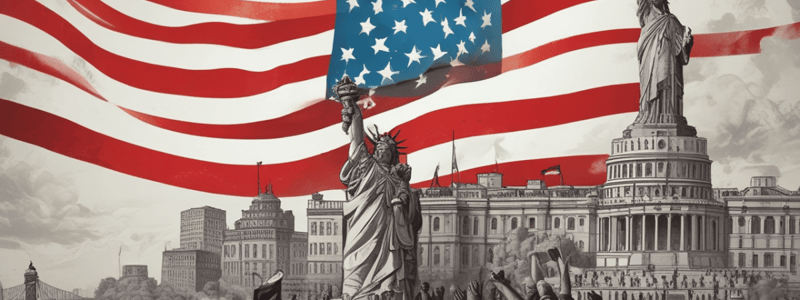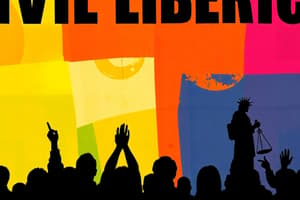Podcast
Questions and Answers
Which of the following rights is protected by the First Amendment?
Which of the following rights is protected by the First Amendment?
- Right to a fair trial
- Right to privacy
- Right to bear arms
- Freedom of speech and press (correct)
What is the main purpose of the procedural rights for the accused?
What is the main purpose of the procedural rights for the accused?
- To ensure a fair trial for the accused (correct)
- To protect the rights of the victims
- To regulate the right to bear arms
- To guarantee the right to privacy
Which amendment guarantees equal protection under the law?
Which amendment guarantees equal protection under the law?
- 13th Amendment
- 15th Amendment
- 16th Amendment
- 14th Amendment (correct)
What is the role of courts in deciding civil liberty cases?
What is the role of courts in deciding civil liberty cases?
What is the concept of basic civil rights all about?
What is the concept of basic civil rights all about?
What is a major limitation of the freedom of speech in the United States?
What is a major limitation of the freedom of speech in the United States?
What is the main purpose of the right to privacy?
What is the main purpose of the right to privacy?
What is the significance of the 14th Amendment in the context of civil rights?
What is the significance of the 14th Amendment in the context of civil rights?
Which of the following civil liberties has been the subject of much controversy in the United States?
Which of the following civil liberties has been the subject of much controversy in the United States?
What is the historical significance of the civil rights movement in the United States?
What is the historical significance of the civil rights movement in the United States?
Which of the following civil liberties is often considered a fundamental aspect of democratic governance?
Which of the following civil liberties is often considered a fundamental aspect of democratic governance?
The 14th Amendment to the US Constitution is primarily concerned with which of the following?
The 14th Amendment to the US Constitution is primarily concerned with which of the following?
Which of the following civil rights is often considered a fundamental aspect of human dignity?
Which of the following civil rights is often considered a fundamental aspect of human dignity?
Which of the following historical events marked a significant turning point in the struggle for civil rights in the United States?
Which of the following historical events marked a significant turning point in the struggle for civil rights in the United States?
Which of the following limits is often placed on the freedom of speech in the United States?
Which of the following limits is often placed on the freedom of speech in the United States?
What is the primary purpose of the procedural rights for the accused?
What is the primary purpose of the procedural rights for the accused?
What is the main significance of the 14th Amendment in the context of civil rights?
What is the main significance of the 14th Amendment in the context of civil rights?
What is the primary limitation of the freedom of assembly?
What is the primary limitation of the freedom of assembly?
What is the main significance of the civil rights movement in the United States?
What is the main significance of the civil rights movement in the United States?
What is the primary role of the courts in deciding civil liberty cases?
What is the primary role of the courts in deciding civil liberty cases?
Flashcards are hidden until you start studying
Study Notes
History of Civil Liberties in the United States
- The history of civil liberties in the US dates back to the nation's founding, with the Bill of Rights (1789) establishing key protections for individuals
- The 14th Amendment (1868) further expanded civil liberties, particularly for African Americans
- Major milestones include the Civil Rights Act of 1964 and the Americans with Disabilities Act of 1990
Freedom of Speech, Press, Religion, and Assembly
- Freedom of speech: protected by the 1st Amendment, allows individuals to express opinions without government interference
- Freedom of the press: ensures a free and independent press, essential for a democratic society
- Freedom of religion: guarantees the right to practice any religion, or none at all
- Freedom of assembly: allows individuals to peacefully gather and protest
- Limitations exist, such as fighting words, obscenity, and national security concerns
Procedural Rights for the Accused
- Guaranteed by the 4th, 5th, 6th, and 8th Amendments
- Includes the right to due process, protection from unreasonable searches and seizures, and the right to a fair trial
- The 5th Amendment also guarantees the right against self-incrimination
Right to Privacy and Right to Bear Arms
- The right to privacy, implied in the 4th and 14th Amendments, protects individual autonomy and personal choices
- The 2nd Amendment guarantees the right to bear arms, with ongoing debates surrounding gun control
The Role of Courts in Deciding Civil Liberty Cases
- The Supreme Court plays a crucial role in interpreting the Constitution and protecting civil liberties
- Landmark cases, such as Roe v. Wade (1973) and Miranda v. Arizona (1966), have significantly impacted civil liberties
History of Civil Rights
- The Civil Rights Movement (1950s-1960s) focused on racial equality and social justice
- Key figures, such as Martin Luther King Jr., played a significant role in the movement
- The Civil Rights Act of 1964 and the Voting Rights Act of 1965 were major legislative achievements
Basic Civil Rights for All
- Civil rights are essential for ensuring equal protection and opportunities for all individuals
- These rights are enforceable by law and protect against discrimination based on race, gender, religion, and other characteristics
Equal Protection under the 14th Amendment
- The 14th Amendment guarantees equal protection under the law, prohibiting discrimination by state governments
- This amendment has been used to challenge discrimination based on race, gender, and other characteristics
History of Civil Liberties in the United States
- The history of civil liberties in the US dates back to the nation's founding, with the Bill of Rights (1789) establishing key protections for individuals
- The 14th Amendment (1868) further expanded civil liberties, particularly for African Americans
- Major milestones include the Civil Rights Act of 1964 and the Americans with Disabilities Act of 1990
Freedom of Speech, Press, Religion, and Assembly
- Freedom of speech: protected by the 1st Amendment, allows individuals to express opinions without government interference
- Freedom of the press: ensures a free and independent press, essential for a democratic society
- Freedom of religion: guarantees the right to practice any religion, or none at all
- Freedom of assembly: allows individuals to peacefully gather and protest
- Limitations exist, such as fighting words, obscenity, and national security concerns
Procedural Rights for the Accused
- Guaranteed by the 4th, 5th, 6th, and 8th Amendments
- Includes the right to due process, protection from unreasonable searches and seizures, and the right to a fair trial
- The 5th Amendment also guarantees the right against self-incrimination
Right to Privacy and Right to Bear Arms
- The right to privacy, implied in the 4th and 14th Amendments, protects individual autonomy and personal choices
- The 2nd Amendment guarantees the right to bear arms, with ongoing debates surrounding gun control
The Role of Courts in Deciding Civil Liberty Cases
- The Supreme Court plays a crucial role in interpreting the Constitution and protecting civil liberties
- Landmark cases, such as Roe v. Wade (1973) and Miranda v. Arizona (1966), have significantly impacted civil liberties
History of Civil Rights
- The Civil Rights Movement (1950s-1960s) focused on racial equality and social justice
- Key figures, such as Martin Luther King Jr., played a significant role in the movement
- The Civil Rights Act of 1964 and the Voting Rights Act of 1965 were major legislative achievements
Basic Civil Rights for All
- Civil rights are essential for ensuring equal protection and opportunities for all individuals
- These rights are enforceable by law and protect against discrimination based on race, gender, religion, and other characteristics
Equal Protection under the 14th Amendment
- The 14th Amendment guarantees equal protection under the law, prohibiting discrimination by state governments
- This amendment has been used to challenge discrimination based on race, gender, and other characteristics
History of Civil Liberties in the United States
- The history of civil liberties in the US dates back to the nation's founding, with the Bill of Rights (1789) establishing key protections for individuals
- The 14th Amendment (1868) further expanded civil liberties, particularly for African Americans
- Major milestones include the Civil Rights Act of 1964 and the Americans with Disabilities Act of 1990
Freedom of Speech, Press, Religion, and Assembly
- Freedom of speech: protected by the 1st Amendment, allows individuals to express opinions without government interference
- Freedom of the press: ensures a free and independent press, essential for a democratic society
- Freedom of religion: guarantees the right to practice any religion, or none at all
- Freedom of assembly: allows individuals to peacefully gather and protest
- Limitations exist, such as fighting words, obscenity, and national security concerns
Procedural Rights for the Accused
- Guaranteed by the 4th, 5th, 6th, and 8th Amendments
- Includes the right to due process, protection from unreasonable searches and seizures, and the right to a fair trial
- The 5th Amendment also guarantees the right against self-incrimination
Right to Privacy and Right to Bear Arms
- The right to privacy, implied in the 4th and 14th Amendments, protects individual autonomy and personal choices
- The 2nd Amendment guarantees the right to bear arms, with ongoing debates surrounding gun control
The Role of Courts in Deciding Civil Liberty Cases
- The Supreme Court plays a crucial role in interpreting the Constitution and protecting civil liberties
- Landmark cases, such as Roe v. Wade (1973) and Miranda v. Arizona (1966), have significantly impacted civil liberties
History of Civil Rights
- The Civil Rights Movement (1950s-1960s) focused on racial equality and social justice
- Key figures, such as Martin Luther King Jr., played a significant role in the movement
- The Civil Rights Act of 1964 and the Voting Rights Act of 1965 were major legislative achievements
Basic Civil Rights for All
- Civil rights are essential for ensuring equal protection and opportunities for all individuals
- These rights are enforceable by law and protect against discrimination based on race, gender, religion, and other characteristics
Equal Protection under the 14th Amendment
- The 14th Amendment guarantees equal protection under the law, prohibiting discrimination by state governments
- This amendment has been used to challenge discrimination based on race, gender, and other characteristics
History of Civil Liberties in the United States
- The history of civil liberties in the US dates back to the nation's founding, with the Bill of Rights (1789) establishing key protections for individuals
- The 14th Amendment (1868) further expanded civil liberties, particularly for African Americans
- Major milestones include the Civil Rights Act of 1964 and the Americans with Disabilities Act of 1990
Freedom of Speech, Press, Religion, and Assembly
- Freedom of speech: protected by the 1st Amendment, allows individuals to express opinions without government interference
- Freedom of the press: ensures a free and independent press, essential for a democratic society
- Freedom of religion: guarantees the right to practice any religion, or none at all
- Freedom of assembly: allows individuals to peacefully gather and protest
- Limitations exist, such as fighting words, obscenity, and national security concerns
Procedural Rights for the Accused
- Guaranteed by the 4th, 5th, 6th, and 8th Amendments
- Includes the right to due process, protection from unreasonable searches and seizures, and the right to a fair trial
- The 5th Amendment also guarantees the right against self-incrimination
Right to Privacy and Right to Bear Arms
- The right to privacy, implied in the 4th and 14th Amendments, protects individual autonomy and personal choices
- The 2nd Amendment guarantees the right to bear arms, with ongoing debates surrounding gun control
The Role of Courts in Deciding Civil Liberty Cases
- The Supreme Court plays a crucial role in interpreting the Constitution and protecting civil liberties
- Landmark cases, such as Roe v. Wade (1973) and Miranda v. Arizona (1966), have significantly impacted civil liberties
History of Civil Rights
- The Civil Rights Movement (1950s-1960s) focused on racial equality and social justice
- Key figures, such as Martin Luther King Jr., played a significant role in the movement
- The Civil Rights Act of 1964 and the Voting Rights Act of 1965 were major legislative achievements
Basic Civil Rights for All
- Civil rights are essential for ensuring equal protection and opportunities for all individuals
- These rights are enforceable by law and protect against discrimination based on race, gender, religion, and other characteristics
Equal Protection under the 14th Amendment
- The 14th Amendment guarantees equal protection under the law, prohibiting discrimination by state governments
- This amendment has been used to challenge discrimination based on race, gender, and other characteristics
Studying That Suits You
Use AI to generate personalized quizzes and flashcards to suit your learning preferences.




